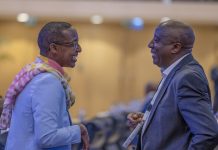Joseph Rwagatare
Africa-Press – Rwanda. The war in eastern Democratic Republic of Congo (DR Congo) between the government and the M23 rebels is in the third year in its current phase and shows no sign of ending soon.
Certainly not by the government of President Felix Tshisekedi that started it despite the humiliating defeat on the battlefield and huge defence expenditure on military equipment and foreign lobbying.
Battlefield reverses, however, may now be having some effect. President Tshisekedi has finally agreed to talk to the M23 rebels in Luanda, Angola, perhaps after realising that he cannot win the war.
The talks start on Tuesday, March 18. He had vowed he would never talk to what he calls terrorists and foreigners backed by Rwanda. His western backers and some in the region repeat this false claim.
He could have done that much earlier and prevented enormous loss of life, economic damage and disruption in international relations. But he chose war.
I doubt many are holding their breath regarding the outcome of the talks. President Tshisekedi is not famous for keeping his word or honouring agreements.
Still, the people in eastern DR Congo and others in the region of good will hope for a positive outcome: agreement on a ceasefire, cessation of hostilities, recognition of M23’s legitimate grievances and demands, and negotiations on a long-term solution to the problems.
As Tshisekedi’s forces suffered defeat after defeat, he adopted a diversionary strategy instead of dealing with the war or addressing the reasons that led to it.
First, egged on by his foreign backers, principally Belgium, he claimed that this was an invasion by Rwanda.
Second, he threatened to attack Rwanda and cause regime change. Some in his government even spoke of annexing Rwanda and make it part of DR Congo.
Third, based on this false claim of foreign invasion, he mounted a diplomatic offensive to have Rwanda punished for its alleged invasion of his country. His foreign minister, Therese Kayikwamba Wgner has been to many western capitals to plead for sanctions against Rwanda.
Belgium, already in bed with DR Congo and the originator of the problems in the region in the first place picked up the plea and became the country’s lead advocate and chief lobbyist. Others countries fell to the seduction and other Congolese inducements, and for selfish reasons imposed some punitive measures on Rwanda.
The punishment is misplaced and certainly unfair, and will not end the war in eastern DR Congo or remove the reasons that caused it. Rwandans are, of course, aware that the sanctions will cause some discomfort and disruption and will no doubt take measures to limit the damage.
As Congolese authorities and some in the region who thought they were heavy punchers and jumped into the fray to teach little Rwanda a lesson have found out to their cost, and others will soon do, Rwanda is not a country that can easily be put down.
All of them have probably not reckoned with Rwandans’ resolve where the security of their country and their lives are concerned. They are not easily intimidated. No amount of threats will move them when they know right and truth are on their side. They will take bold action when that is what is required.
It is not surprising therefore, that on Monday, March 17 Rwanda broke diplomatic relations with Belgium. In mid-February, it had suspended development cooperation with Belgium It is not the first time either. It happened with France in 2006 when it expelled the French ambassador. Rarely does a developing country do that.
Belgium particularly has not reckoned with the history of Rwanda. The country suffered under Belgian colonial rule, first by having its territory carved and parts of it given to other countries, then by dividing Rwandans along non-existent racial or ethnic lines, and finally by instigating and actively taking part in the removal of a section of Rwandans and sending them into exile.
Pogroms of the Tutsi that were to culminate in their genocide in 1994 started under the watch and instigation of the Belgians as the colonial authority.
They continue to take sides in the DRC conflict and again singled out Rwanda for punishment for a problem for which they are ultimately responsible.
They have probably not reckoned with the amount of resilience Rwandans have. They survived the near destruction of their nation barely thirty years ago.
President Paul Kagame told thousands of Rwandans in Kigali on Sunday March 16 that they endured the worst then and there is nothing that they cannot withstand.
They then went on to reconstruct their nation in very difficult circumstances to where it is today and will not permit any compromise or destruction of this achievement.
Anyone thinking that they can remove their leader or drive a wedge between him and them is gravely mistaken. The love they have for him is immense and so is the trust in him, and this is reciprocated.
Talk of attack, regime change and sanctions will probably have the opposite effect to what is intended. They have cemented the unity of Rwandans, raised their level of patriotism and increased their resolve to defend their country against all forms of attack.
Source: The New Times
For More News And Analysis About Rwanda Follow Africa-Press






